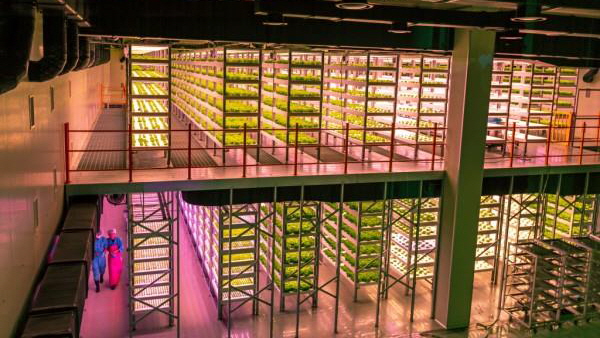11월12일부터 전국 1,315개 산업단지(2024년 2분기 현재) 안에 건축물 형태의 수직농장(또는 식물공장) 입주할 수 있도록 법적 근거가 마련됐다.
12일부터 산업집적법·산업입지법 개정 시행
LED 등 부가가치세 환급 품목 추가 협의 중
12일부터 산업단지에서 수직농장 입주가 허용되며, 스마트 팜 및 스마트농기자재 생산 관련 산업이 활성화 될 것으로 기대가 모아진다.
산업통상자원부(장관 안덕근)는 11월12일부터 전국 1,315개 산업단지(2024년 2분기 현재) 안에 건축물 형태의 수직농장(또는 식물공장) 입주할 수 있도록 법적 근거가 마련됐다고 11일 밝혔다.
지난 2월 울산 민생토론회 등에서 제기된 농산업계 요구에 대하여, 정부는 3월26일 산업부-농림축산식품부(이하 농식품부)-국토교통부(이하 국토부) 장관급 합동 현장간담회를 열고 연내 규제개선을 약속한 바 있다.
농식품부는 지난 7월26일 스마트농업법 시행령을 제정하여 새로운 형태의 스마트팜인 수직농장 산업 활성화를 위한 법적 지원 근거를 마련했다.
이어 산업단지 입주자격과 입주대상 업종을 관리하는 산업부와 국토부가 산업집적법 시행령(산업부) 및 산업입지법 시행령(국토부) 개정을 완료함으로써, 수직농장은 농작물 생산시설로는 최초로 산업단지 입주자격을 얻게 됐다.
그간 산업단지는 제조업, 지식산업 등을 입주대상으로 하고 있어 농작물을 재배하는 ‘농업’에 해당하는 수직농장은 입주가 허용되지 않았었다.
농식품부는 규제개선 추진 발표 이후, 수직농장을 경영하는 농업인도 농업경영체 등록을 할 수 있는 기준을 신설(10월)하였으며, 스마트팜 종합자금, 스마트팜 ICT융복합 확산사업 등 정책지원 대상에 수직농장을 포함(2025년부터)했다.
K-수직농장세계화프로젝트를 담은 2025년도 신규 R&D 예산안도 국회에 제출했다.
또한 수직농장을 운영하는 우수 농업회사법인은 사업범위를 스마트농기자재 생산과 농업인 교육까지 확대할 수 있도록 관련 법령 개정도 추진 중이다. 경영비 절감을 위해 수직농장의 핵심 기자재인 LED 등의 부가가치세 환급 품목 추가도 기재부와 협의 중이다.
이러한 제도 개선과 지원에 힘입어, 국가식품클러스터(국가산단, 익산 소재)에 입주 및 투자를 희망하는 기업들도 늘고 있다. 식품업계는 그간 산업단지를 활용한 수직농장 사업모델을 정부와 협의해왔다.
고품질의 원료·소재 작물을 수직농장에서 연중 안정적으로 생산하고, 인접한 공장에서 부가가치가 높은 가공제품을 제조하면서 물류·에너지 효율화 등 타 산업과의 시너지도 창출할 수 있는 여건이 조성될 것으로 업계는 기대하고 있다.
오승철 산업부 산업기반실장은 “농업과 정보통신기술 등이 융합된 수직농장이 산업단지에 입주할 수 있게 됨으로써 입지확보에 어려움을 겪는 수직농장 산업의 활성화와 ICT·로봇·센서 등의 연관 산업과의 동반성장을 기대할수 있게 됐다”며 “수직농장이 신산업의 하나로 산업단지에 정착할 수 있도록 적극 지원할 예정이다”고 밝혔다.
